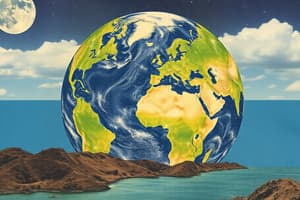Podcast
Questions and Answers
Which of the following is NOT a reason why planet Earth is considered unique?
Which of the following is NOT a reason why planet Earth is considered unique?
- It has plate tectonics
- It has few nutrients available (correct)
- It has a protective atmosphere
- It has liquid water
Which of the following features do Venus, Earth, and Mars share?
Which of the following features do Venus, Earth, and Mars share?
- Presence of liquid water
- Oxygen in their atmospheres
- Existence of life forms
- Solid rock and silicate composition (correct)
What is a consequence of volcanic activity on gas planets regarding life?
What is a consequence of volcanic activity on gas planets regarding life?
- It spreads nutrients too thin. (correct)
- It introduces more life forms.
- It fuels organisms' growth.
- It increases water availability.
What aspect of Earth’s atmosphere contributes to its habitability?
What aspect of Earth’s atmosphere contributes to its habitability?
Which planet is noted for having no water in its environment?
Which planet is noted for having no water in its environment?
What is a primary nutrient that all living organisms require?
What is a primary nutrient that all living organisms require?
Which factor primarily supports the circulation of nutrients on a planet?
Which factor primarily supports the circulation of nutrients on a planet?
Which terrestrial planet has conditions suitable for sustaining life forms?
Which terrestrial planet has conditions suitable for sustaining life forms?
What role do greenhouse gases play in an atmosphere?
What role do greenhouse gases play in an atmosphere?
Which of the following best describes Mars' atmosphere?
Which of the following best describes Mars' atmosphere?
What is a consequence of light energy on a planet's surface conditions?
What is a consequence of light energy on a planet's surface conditions?
What do small to medium-sized planets require for sustaining life?
What do small to medium-sized planets require for sustaining life?
Why is a stable nutrient cycle necessary for solid planets?
Why is a stable nutrient cycle necessary for solid planets?
How does the presence of an atmosphere affect a planet's temperature?
How does the presence of an atmosphere affect a planet's temperature?
What can lead to harmful conditions on a planet?
What can lead to harmful conditions on a planet?
What is the primary characteristic of Earth that differentiates it from others?
What is the primary characteristic of Earth that differentiates it from others?
What range of temperature is considered suitable for life on Earth?
What range of temperature is considered suitable for life on Earth?
What factor primarily influences the chemical reactions necessary for life on Earth?
What factor primarily influences the chemical reactions necessary for life on Earth?
How does insufficient gravity affect a planet's habitability?
How does insufficient gravity affect a planet's habitability?
What happens to proteins and carbohydrate molecules at temperatures around 125°C?
What happens to proteins and carbohydrate molecules at temperatures around 125°C?
Which planet has an atmosphere that is 100 times thicker than Earth's?
Which planet has an atmosphere that is 100 times thicker than Earth's?
What is a critical characteristic that allows Earth to sustain life?
What is a critical characteristic that allows Earth to sustain life?
Why is the Earth's surface considered unique among solid planets in the solar system?
Why is the Earth's surface considered unique among solid planets in the solar system?
What effect does high temperature have on the evaporation of water?
What effect does high temperature have on the evaporation of water?
Flashcards are hidden until you start studying
Study Notes
Origin and Structure of the Planet Earth
- Earth is unique in the solar system, being the only planet that supports life.
- Factors influencing habitability include temperature, atmosphere, energy, and nutrients.
Temperature
- Low temperatures hinder chemical reactions essential for life.
- Optimal temperature range for life is between -15°C to 115°C; outside this range, liquid water cannot exist.
- Extreme heat (above 125°C) can break down crucial biological molecules like proteins and genetic material.
Atmosphere
- Small planets lack sufficient gravity to retain an atmosphere, while Earth has a thick atmosphere (about 100 miles) providing warmth and radiation protection.
- Venus has a much thicker atmosphere, leading to extreme surface temperatures unsuitable for life.
- Mars has a thin atmosphere (1/100th of Earth's), providing insufficient insulation.
Energy
- Lack of adequate light or chemical energy restricts life-sustaining processes.
- Too much sunlight or harmful rays (like ultraviolet) can be detrimental to living organisms.
- Energy-rich chemicals are essential for life, and overcrowding these can also be problematic.
Nutrients
- Essential for the growth and maintenance of living organisms; without them, life cannot be sustained.
- Earth supports a water cycle and has volcanic activity that helps circulate nutrients, which is essential for life.
- Solid planets require efficient nutrient transportation systems to sustain life; those with insufficient systems cannot support life.
Unique Characteristics of Earth
- Contains liquid water, vital for all forms of life.
- Exhibits plate tectonics that facilitate a dynamic environment.
- Possesses an atmosphere that protects against harmful solar radiation.
Earth’s Habitable Features
- Positioned at an optimal distance from the sun ensures adequate warmth.
- Insulating atmosphere fosters stable temperatures conducive to life.
- Contains necessary chemical ingredients such as water and carbon.
Comparison of Terrestrial Planets
Similarities
- All are terrestrial, composed of solid rocks and silicates.
- Each has an atmosphere and comparable rotational periods.
- Earth and Mars have water present and all feature carbon dioxide and landforms.
Differences
- Venus lacks water entirely while Earth supports diverse life forms.
- Venus and Mars do not contain oxygen, whereas Earth is rich in it.
Studying That Suits You
Use AI to generate personalized quizzes and flashcards to suit your learning preferences.




